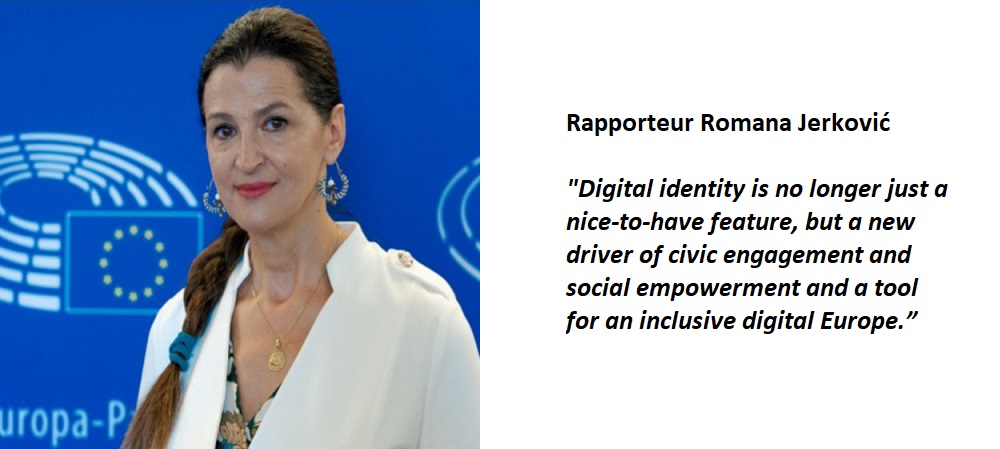
„The new eID would allow citizens to identify and authenticate themselves online (via a European digital identity wallet) without having to resort to commercial providers, as is the case today – a practice that raised trust, security and privacy concerns. It would also give users full control of their data and let them decide what information to share and with whom.” – according to the press release.
The Industry, Research and Energy Committee adopted its position on the proposed update of the European digital identity framework (eID) by 55 votes to 8, with 2 abstentions.
In their amendments, MEPs propose to make the European Digital Identity Wallet a tool that can also read and verify electronic documents, and allow for peer-to-peer interactions. They propose measures to strengthen privacy and cybersecurity as well as to register all transactions to ensure third parties are held accountable.
Using the EU wallet will always be voluntary. MEPs also want to ensure that citizens who choose not to adopt it are not treated differently to those who do. The scheme would require each member state to notify at least one “Wallet” under a national eID scheme to make them interoperable at EU level.
The draft legislation includes provisions to securely request, obtain, store, combine and use personal identification data and electronic certificates, that can be used to authenticate online and offline and to access goods and public and private services.
“Rapporteur Romana Jerković (S&D, HR) said: “With the European Digital Identity Framework, we want the EU to become the first global region with a governance framework for trusted digital identities. The Digital Wallet will become a reliable, all-in-one identity gateway that puts citizens in full control of their own data and gives them the freedom to decide exactly what information to share, with whom, and when. From social, financial, medical, and professional data, to contacts and much more, it will make it possible to store personal credentials within a single digital ID. Digital identity is no longer just a nice-to-have feature, but a new driver of civic engagement and social empowerment and a tool for an inclusive digital Europe.”
„The MEPs today also gave their green light for the Parliament to enter into interistitutional negotiations with the Council of the European Union, pending formal approval of the 13-16 March plenary session. The kick-off trilogue is expected to place in the second half of March.” – says Vedran L., Head of Office at European Parliament | Digital Identity | Lead on eIDAS 2.0 report.
Some of the key highlights from the report:
🔴 The European Digital Identity Wallet: it will have to be certified at level ‘high’ and built on ‘privacy-by-design’, ‘security-by-design’ & open source architecture. It will also allow for peer-to-peer (P2P) connectivity between two Wallets and between a Wallet and a Relying Party. Zero Knowledge Proof (ZKP) & ‘selective disclosure’ are core functions of the wallet, as is the use of pseudonyms. The use of the Wallet on strictly voluntary basis! Governments and attribute providers are prevented by technical means from observing concrete user behaviour.
🔴 Cybersecurity: the new framework is now closer aligned to Cybersecurity Act and NIS2 Directive.
🔴 Relying Parties: relying parties that want to access special categories of personal data (Art. 9 of GDPR) in the Wallet, such as health data, will need to justify their request to the Member States authorities. The RPs will also need to authenticate & identify themselves to the users of the Wallet before any form of transaction can take place.
🔴 Anti-discrimination protections are strong: access to public and private services, access to the labour market and freedom to conduct business shall not in any way be restricted or made disadvantageous for natural or legal persons not using European Digital Identity Wallets.
🔴 Data portability is enabled: in order to avoid lock-in effects, the issuers of the European Digital Identity Wallets should at the request of the user of the Wallet, provide for effective portability of data, including provisions of continuous and real-time access to services, and not use contractual or other barriers to prevent switching between different Wallets.
🔴 Minimum penalties for Trust Service Providers are beefed up in case of violations of privacy of the users.
🔴 An updated governance framework and the new European Digital Identity Framework Board will help with enforcement and exchange of best practices.
Link to the report: Proposal for a REGULATION OF THE EUROPEAN PARLIAMENT AND OF THE COUNCIL
amending Regulation (EU) No 910/2014 as regards establishing a framework for a European Digital Identity
Banking 4.0 – „how was the experience for you”
„To be honest I think that Sinaia, your conference, is much better then Davos.”
Many more interesting quotes in the video below: